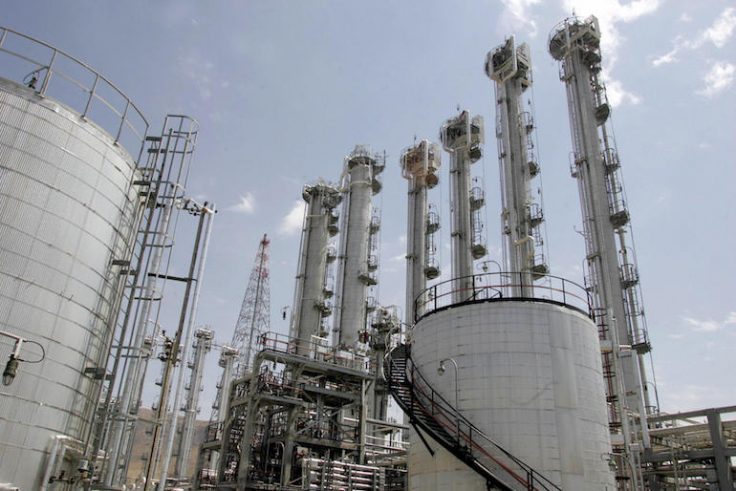The Trump administration is considering sanctions on an unidentified international purchaser of Iranian nuclear materials to prevent Tehran from exporting materials that could power an atomic weapon, administration officials tell the Washington Free Beacon.
Iran has moved in recent months to increase its stockpile of heavy water, which is used during nuclear operations to create high quality plutonium and can be used to achieve a plutonium-based pathway to a nuclear weapon. While the Trump administration has tightened restrictions on Iranian exports of heavy water, international nuclear inspectors recently determined that Tehran sold the material to an undisclosed international buyer at least four times since May.
The revelation has amplified concerns among nuclear experts and administration officials that additional sanctions may be necessary to ensure Iran does not become an international seller of heavy water, which could net the financially ailing regime millions in cash.
A senior Trump administration official, speaking on condition of anonymity, told the Free Beacon U.S. officials are concerned by reports of Iran's nuclear dealings and will move to hold any sanctions violators accountable.
A State Department official, also speaking only on background, said those purchasing Iranian nuclear materials could be subject to sanctions.
"We have seen reports that Iran continues to sell heavy water to international buyers. We have made clear that such transactions are potentially sanctionable," the official told the Free Beacon. "Iran has no credible reason to continue its heavy water production activities. The Iranian regime uses its nuclear program to extort the international community and threaten regional security. Secretary [of State Mike] Pompeo has underscored that nuclear escalation will not strengthen Iran's position, but instead lead to further isolation and pressure."
Neither the White House nor the State Department identified the party that made the purchases.
The matter has become a flashpoint in U.S.-Iran relations in light of Tehran's repeated breaches of restrictions on the amount of heavy water it can keep in the country. Under the terms of the landmark nuclear agreement, Iran was permitted to sell its excess heavy water on the international marketplace without facing penalties in order to ensure Tehran did not retain more than 130 tons. During the Obama administration, the United States purchased at least $8.6 million worth of Iranian heavy water in a bid to keep Iran in compliance with the nuclear deal.
While the party purchasing Iran's heavy water remains unconfirmed, nuclear proliferation experts suspect Russia is the most likely candidate.
"Allies will end the practice of buying heavy water if asked," Andrea Stricker, a nuclear expert and research fellow at the Foundation for Defense of Democracies—a D.C.-based think tank—told the Free Beacon. "Even if Russia, a non-ally, is buying this heavy water, there is no reason to think it will continue to do so if the alternative is U.S. sanctions. Moscow has swiftly shut down civil nuclear activities in Iran that would run afoul of sanctions, such as when the administration rescinded waivers for uranium swaps and work at the Fordow enrichment facility," which formerly contained the regime's atomic weapons program.
Stricker, in a policy briefing issued this week, urged the Trump administration to crack down on any party discovered to be purchasing Iran's excess heavy water. She pointed out to the Free Beacon that Tehran's continued work with heavy water "could very quickly put Tehran back on course to having a plutonium pathway to nuclear weapons."
"This underscores how slow the JCPOA's implementation has been," Stricker said, using the nuclear deal's official acronym. "A new, stronger deal is needed that prevents the regime from slow-walking or circumventing its commitments."
The issue is exacerbated by Iran's continued breaches of nuclear-related safeguard commitments codified under the Iran deal.
"Iran is a state under investigation for noncompliance with its safeguards agreements and is now committing regular overages of the JCPOA," Stricker explained. "It should not be permitted the same treatment as a legitimate nuclear supplier. The international community should demand that Iran act like a responsible party and not succumb to nuclear blackmail."
